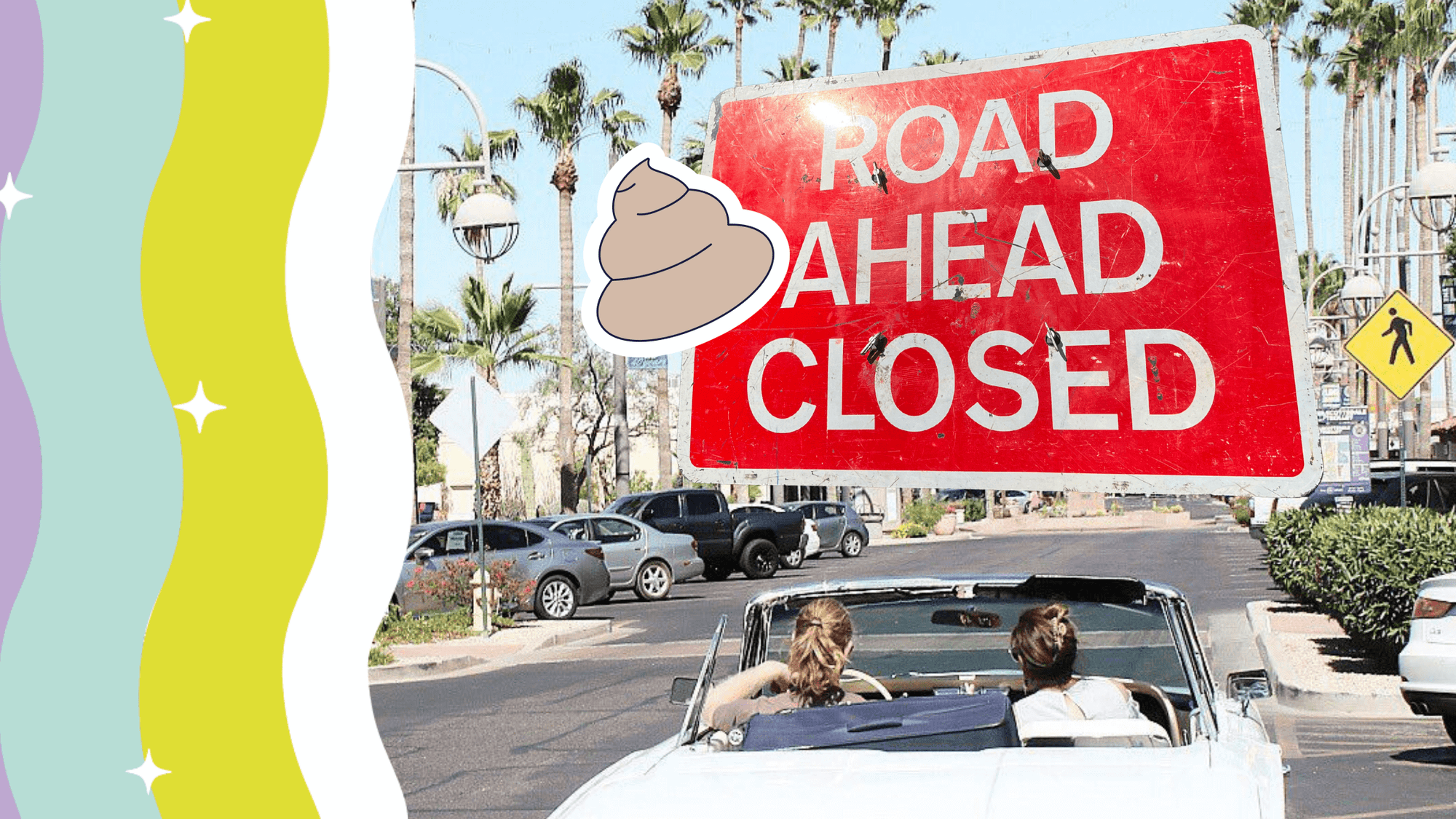If you find that you get extra bloating when you go on holiday, you’re not alone. The dreaded holiday bloat can impact anybody and it’s something that most people try to ignore so that they can enjoy their time away from home.
There are a number of reasons why you might feel bloated while you’re on holiday. Traveling for long periods of time, jet lag, eating unusual foods, and being out in the heat for several hours a day are also common factors that contribute to digestive troubles.
Luckily, there are also plenty of ways to stop bloating and minimize your digestive discomfort while you’re away. No matter where you’re going or what you plan to eat, you can use a supplement for bloating or a natural gas relief remedy to ensure you can enjoy your holiday bloat-free.
Let’s take a closer look at the causes of holiday bloating and how you can stop excess gas from ruining your time away.
Why Does Holiday Bloating Happen?
As we briefly mentioned above, there is a wide range of reasons why you might experience holiday bloating. Here are some of the most common reasons for digestive disturbances when you’re on holiday.
Travelling & Plane Bloating
When you’re sitting on an airplane or in a car for several hours, you can miss your usual meal times. As a result, your natural digestive processes can be disrupted and you might find that you get bloated and constipated.
You may also find it difficult to eat healthy and nutritious meals like you usually would at home. When your diet lacks adequate amounts of fiber, it can slow down the digestion of your food and cause bloating.
Due to a lack of movement, your bowels don't get the same stimulation which helps move gas out of the body. With planes, you're also likely to feel more bloated as pressure in the plane cabin changes, meaning gas in your stomach expands. The best way to avoid this is to start your ritual before you get on the plane - avoiding fizzy drinks, foods that make you gassy (sorry broccoli) chewing gum, sugar and drinking plenty of water.

Eating Different Foods
When you’re on holiday in a foreign country, it’s tempting to try all of the different dishes of the local cuisine. While it’s great to expand your palette and eat delicious and exciting foods, you also need to be conscious of your digestive health.
Eating lots of foods that you’re not used to eating can cause your digestive system to go into overdrive. For example, if your usual diet consists of mostly plain foods and you head to a country whose cuisine is full of spicy dishes, you might experience diarrhoea.
If you’re not a big meat-eater at home and you decide to try some unusual cuts of meat while you’re on holiday, it could cause some digestive discomfort.
Our dear friend, carbs, are also a big hit on holiday - think bread before the meal, pasta etc - it can be a pretty carb heavy setting. This can cause bloating and maybe even back you up, trapping gas in the process.
Hot Weather
Sitting or walking outside in the heat all day is great for your health as it can increase the synthesis of vitamin D in your skin.
Vitamin D is actually a hormone that can improve hormonal health and bone health. Being out in the sunshine has also been shown to improve your mental health by boosting the production of serotonin and dopamine in your brain.
With all of that being said, hot weather can have negative effects on your digestive health. You can often feel more bloated in the heat. Being outside in the sun all day can cause your body temperature to increase, and this may leave you feeling swollen and puffy due to water retention. In hot weather your body wants to retain water - coupled with salty food - which gives you a puffy feeling. To get rid of this, drink plenty of water and eat magnesium rich foods like nuts, dark chocolate and bananas.
Dehydration
Another common cause of holiday bloating is dehydration. This is especially the case when you’re on holiday in a hot country and you forget to drink enough water throughout the day.
When your body is dehydrated, it can cause your stool to harden, leading to bloating and constipation - resulting in gas being trapped in your intestines.
It will also cause water retention, so drink plenty of water to flush out salt and hard stool!

How Can You Reduce Holiday Bloating?
If you’re prone to holiday bloating, try the following top tips to keep your digestive system healthy while your away.
1) Take Probiotics
Probiotics are live microorganisms that are beneficial for your gut. These tiny organisms break down the fibres in some of the food that you ingest.
You can eat probiotics in different foods or take them as supplements. Probiotic foods include sourdough, tempeh, miso, kimchi, and Kefir. We would avoid Kombucha as it's high in sugar and very fizzy which will cause more gas!
The most widely known beneficial probiotic bacterial species are Lactobacillus and Bifidobacterium. If you’re looking for great supplements that contain probiotics for bloating, search for those that contain high levels of these two species.
Consuming probiotics will reduce excess gas and bloating by aiding your body’s own digestive processes. Your gut naturally contains probiotic bacteria and taking supplements will only enhance your levels of these beneficial bacteria.
If you’re dealing with IBS and bloating, find a supplement that focuses specifically on this condition. You can also get probiotic supplements that are specific to other digestive disorders.
2) Eat Regular, Smaller Portions
You might be on an all-inclusive holiday as an excuse to indulge in all of your favourite meals. While it’s important to make the most of your relaxing holiday and treat yourself to lots of delicious foods, you should avoid eating large volumes of food in one sitting.
Eating large portions can overwhelm your digestive system and cause the movement of food through the gastrointestinal tract to slow down. This can cause bloating, abdominal cramps, and gas pains.
To minimise digestive discomfort while still being able to eat what you want, split your larger meals into smaller ones. This will give your stomach and intestines time between each meal and snack to properly metabolise the food.
3) Exercise Throughout the Day
Instead of relaxing by the pool all day, every day on your holiday, take a walk around the local area or hire a bike and go for a cycling trip. If you’re by the beach, consider participating in some water sports or a volleyball game. Even if you want to lie by the pool all day, think of going on a walk after lunch or organising a few mornings out wandering around the beautiful towns.
Physical activity can encourage the movement of food through your digestive system, helping you to feel less sluggish and bloated after eating. You don’t need to do any intense exercise. A relaxing stroll outside with your loved ones will do the trick.
4) Take Digestive Enzymes Before Eating
This is one of our favourite hacks, and why we put digestive enzymes in Wild Dose. Your body naturally produces digestive enzymes. However, if you’re deficient in certain enzymes, you’re more prone to bloating and digestive discomfort.
When you’re on holiday, you might find it helpful to take a digestive enzyme supplement before your mealtimes to aid your body’s natural digestive processes. They can benefit you even if you don’t have any digestive enzyme deficiencies.
A digestive enzyme supplement can speed up the breakdown of ingested food, preventing excess bloating and gas. They’re easy to take and are effective for most people. Take them around 15-20 minutes before eating.
For example, amylase and protease will help break down gluten!
5) Avoid Unusual Foods
Your digestive system gets used to the foods that you eat regularly. Based on your diet, certain species of microorganisms will thrive in your gut and others will decrease in numbers (in other words, your diet influences your gut microbiome)!

When you start eating completely different foods, it can cause your digestive system to respond negatively. You might get cramps, excess gas, and bloating. These symptoms are common with spicy foods or rich, creamy dishes, so if you’re not used to these types of foods, be careful when you’re on holiday.
You can still enjoy 'heavy' dishes, but avoid overconsuming them to the point where you become bloated. Ideally, you shouldn’t eat an unusual dish (unusual for your diet) any more than once every few days. Stick to familiar foods that your digestive system is used to as much as possible.
6) Drink Enough Water
If you’re experiencing digestive discomfort on holiday, you might want to reach straight for a gas relief remedy or supplement for bloating. But before you take any tablets or supplements, consider drinking more water.
Yes, plain old water could be the answer to getting rid of bloating and excess gas. It aids the movement of food through the digestive tract and reduces the risk of constipation.
It’s important to avoid dehydration for your overall health, not just your digestive health. Dehydration can lead to headaches, dizziness, and fainting.
You’ll need to drink more water if you’re on holiday in a hot country or you’re exercising every day. Aim to drink at least 8 to 10 glasses of water.
7) Avoid Trigger Foods
If there are certain foods that you know trigger your digestive symptoms, avoid them wherever possible while you’re on holiday. Common trigger foods that cause bloating include dairy products, beans, legumes, and high-fibre vegetables, like cauliflower and broccoli.
For those of you with food allergies or intolerances, for obvious reasons, avoid these foods. The last thing you want is a trip to the hospital because your body has reacted to something you’ve eaten!
8) Minimize Your Caffeine and Alcohol Intake
Both caffeine and alcohol can trigger digestive discomfort, as can carbonated drinks. They can increase the chances of diarrhoea and abdominal cramps, neither of which is ideal when you’re trying to enjoy a relaxing holiday.
While you can still consume coffee, wine, and spirits when you’re on holiday, you should drink plenty of water in between. Not only will drinking water keep you hydrated but it will also minimize bloating and heartburn that is often associated with caffeinated or alcoholic beverages.









